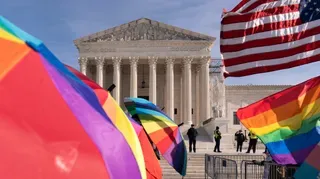September 2, 2011
School's Christian Choir Tosses Gay Member, Faces Scrutiny
Kilian Melloy READ TIME: 5 MIN.
A Christian choir at the University of North Carolina has expelled a gay member, ostensible for his "views on homosexuality," an action that has brought the school-funded group to the attention of officials who will determine whether the expulsion violated university policy.
Members of the a capella choir, Psalm 100, took a vote and unanimously decided to throw Will Thomason, a senior, out of the choir, university newspaper the Daily Tar Heel reported on Sept. 2. Thomason is openly gay, but according to the choir's general director, Blake Templeton, that was not the reason for his expulsion.
Rather, Templeton said, it was Thomason's beliefs that got him axed as a member. The choir's constitution stipulates that members must agree with the bible, which contains passages that are often interpreted to condemn gays, call for their deaths, and consign their souls to eternal damnation.
Templeton stressed that Thomason being gay -- and, according to the text that the choir purportedly holds sacred, destined to go to Hell -- was not the issue behind the vote that led to his expulsion from the group.
"This isn't a salvation issue, and it's not Psalm 100 saying whether or not Will Thomason is a Christian and whether or not he's going to go to heaven," Templeton told the newspaper. "The decision was really about honoring the constitution that the University approved of."
But because the group receives university money, it is required to abide by the policies of the university, which include a ban on discrimination based on sexual orientation.
The Chancellor for Student Affairs told the Daily Tar Heel that charges of the group having violated that policy would be taken seriously, but suggested that the issue was complex.
"Our commitment to non-discrimination is bedrock strong but so is our commitment to the First Amendment rights of freedom of association," Crisp told the newspaper. "The non-discrimination policy for student organizations tries very hard to balance those issues."
"We'll be discussing how we want to respond," said Zealan Hoover, who serves as the university's student body vice president.
The university's administration has not heard any formal complaint about the group's expulsion of the gay student, and the UNC Lesbian, Gay, Bisexual, Transgender and Queer Center reserved judgment until the matter could be looked into.
"I feel confident that the University is going to do its due diligence in making sure that the policy was adhered to, and if they find that it was not adhered to they will take the appropriate action," said the Center's director, Terri Phoenix.
Some private religious schools do not protect the rights of sexual minorities, but many colleges and universities do include non-discrimination clauses in their policies. Those policies have led to clashes both with religious student groups and with the U.S,. military.
Before Congress voted last December to repeal the anti-gay law that barred GLBT servicemembers unless they kept their sexual identities a strictly guarded secret, institutions of higher education -- especially elite institutions such as the Ivy League schools -- refused to allow military recruiters or the ROTC onto their campuses because the Armed Forces fell into the category of employers that discriminated against GLBTs. Since the vote for repeal, however, a number of elite schools have set aside those bans on the ROTC and on military recruiters.
In 2004, Hastings College of Law in San Francisco was sued by student group the Christian Legal Society. The Christian Legal Society bars anyone who engages in "unrepentant homosexual conduct," as well as those who do not share the group's religious beliefs.
Because the group's rules conflicted with the school's policies, the school withheld money and recognition from the group. The initial case resulted in a 5-4 Supreme Court decision that upheld the school's policy.
However, the Supreme Court referred one claim from the case to the Ninth Circuit Court of Appeals -- namely, that Hastings had selectively enforced its policy in a manner that singled out the Christian group.
But a three-judge panel from the lower court ruled against the anti-gay student group because prior to the appeal, the group had not specified such a claim. "The Christian Legal Society never claimed that Hastings' policy was selectively enforced," the panel ruled.
In a mirror-image situation, a gay-straight alliance was left without official recognition at a Christian school of higher learning, an Abilene Christian University student alleged in a letter to the editor of the University's campus newspaper, The Optimist, last year. The student also claimed that the university refused to recognize Ally Week, a GLBT event.
The university's dean of student life told the media that there is a non-harassment policy in place that protects gay students as well as straights, and added that the school would not officially endorse gay groups or events due to its Christian beliefs.
Jean-Noel Thompson said that issues relevant to sexual minorities on campus "[had] been broadly discussed. We don't shy away from such discussion. We are perfectly fine with discussion about sexuality and sexual identity. And we are very serious about our harassment policy."
A subsequent letter to The Optimist from another student condemned gays for expressing their sexual identities. The letter asserted that, "[W]ithout God, no moral rules would exist to limit or condone any sexual activity," and noted, "Repeatedly, throughout the Bible, sexual immorality, adultery and homosexuality are deemed sinful, and those actively participating in such "will not inherit the Kingdom of God" (1 Corinth. 6:9-10)."
The letter went on to state, "When building an alliance with 'queer' organizations, as a university or individual, I believe we are sending a mixed message about what we believe to be right or wrong, acceptable or not."
The author added, "In the former letter, it was mentioned that 'queer' individuals feel their identities are shameful, and that's natural -- because it is. The identity they are seeking acceptance for is wrong."
In fact, the earlier letter had not said that gays feel their sexual identity is shameful. Rather, it stated that gays are given the message by others that there is something shameful about whom they are.
In challenging the colleges refusal to recognize the gay-straight alliance, the author of the original letter wrote, "This culture of silence is toxic to queer students, because it tells them they are alone, that no one wants to hear from them, that their identities are shameful and must be kept secret.
"How many queer teenagers have committed suicide in the past month because their classmates did not accept them?" the letter continued. "The culture of silence is harmful to straight students, because we are uneducated and unprepared to conduct Christian service and leadership in a world that increasingly includes openly queer people.
"If ACU is to fulfill its mission, we must be able to discuss these issues openly between the students and the administration. We must be able and willing to learn from each other."
Kilian Melloy serves as EDGE Media Network's Associate Arts Editor and Staff Contributor. His professional memberships include the National Lesbian & Gay Journalists Association, the Boston Online Film Critics Association, The Gay and Lesbian Entertainment Critics Association, and the Boston Theater Critics Association's Elliot Norton Awards Committee.




